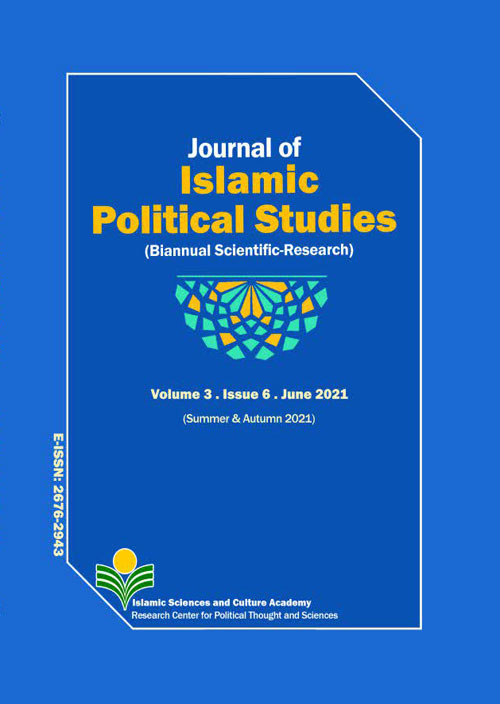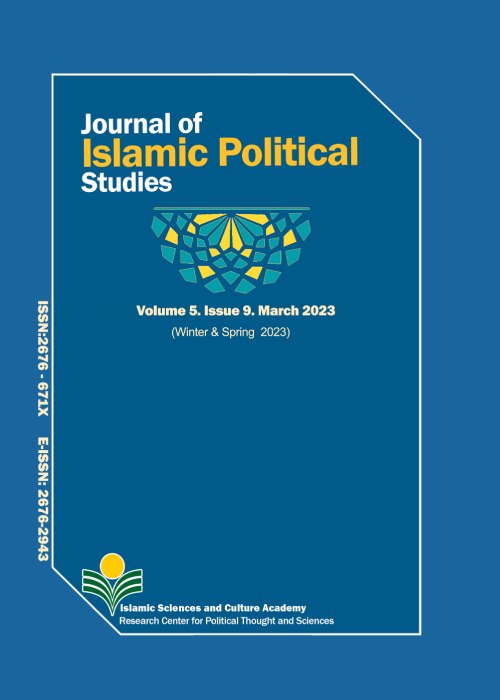فهرست مطالب

Journal of Islamic Political Studies
Volume:3 Issue: 6, Summer-Autumn 2021
- تاریخ انتشار: 1401/08/18
- تعداد عناوین: 6
-
Pages 7-35“Citizenship rights” is considered as one of the new political concepts, but the background of its present and dominant perception goes back to the last few centuries. This idea has been formulated in the context of the modern western semantic system and denotes the rights that belong to the man due to his social and political identity as the citizen of a political society. However, the relationship of the individual inhabitants in a land as the members of a political society with one another and with the established state as well as their rights is a long-standing issue. In spite of the difference in ontology and anthropology of the modern era – on whose basis the modern idea of citizenship has emerged – considering rights for the members of a society has a record in the teachings of the divine religions, especially Islam. The zenith of this humanistic view (not a human-centered one) can be observed in the way of life of Imam Ali as the desirable Islamic ruler. The present article attempts to make use of the semantic method to shed light, as far as it can, on citizenship rights – as a new concept – in Nahj ul-Balāgha. Thus, by pursuing the vocabularies – from the text of Nahj ul-Balāgha – which are in the semantic filed of this research subject, i.e. citizenship, we investigate the related denotations based on the three well-known concepts of civil rights, political rights and social rights as well as their instances.Keywords: Imam Ali, citizenship rights, semantics, modern political concepts, Nahj ul-Balāgha
-
Pages 36-62
Taqiya (religious reservation) is a natural reaction and conforms to the individual’s discretion or that of the minority, which is done on the basis of expediency and aims at rejecting the corruption or attracting the others’ affection. This rule is often used in interaction with opponents and in the form of two types of “apprehensive taqiya” and “tolerating taqiya”. This article aims at revealing the positive roles of taqiya in movements and seeks to prove that in the opposition between taqiya and the factors creating a movement, there is not just a negative role for taqiya, i.e. stagnation and standstill. Rather, on the contrary, the positive roles of mobilizing, converging, immunizing, and the like – which create movements and lead to interaction with movements – are to be considered as well. These positive roles are studied through an analytical-descriptive method. Indeed, taqiya as the strategy of contention is a rational and timely subject, playing various roles in movements depending on the demands of the time. Of course, sometimes it gives up the expediency due to the priorities.
Keywords: taqiya, political jurisprudence, Islamic movement, Convergence, the expediency rule -
Pages 63-80This article aims at presenting the viewpoint of the transcendental philosophy regarding the political theory. The article claims that, regarding the origin of the political theory, the transcendental theosophy has a paradigmatic view in relation to the common viewpoint of the philosophy of social sciences. To do so, we have used the documentary method and, by referring to the claims of the political transcendental philosophers, have sought to investigate our claim to show that the transcendental philosophy, unlike what Karl Popper maintains, regards the origin of the theory among the issues related to the philosophy of the social sciences, not a psychological issue. From the findings of this article, we can conclude that the transcendental philosophy does not restrict itself, in constructing the political theory, to just the creative role of the mind. Rather, it considers the role of creative inspirations as well. Accordingly, it considers both constructing the political theory and testing it as one of the methodological issues. Among the achievements of this point, we can refer to the relationship of the logical aspects and ontological aspects of the subjects in philosophy of the social sciences.Keywords: Transcendental Philosophy, political theory, philosophy of social sciences, Methodology, Ontology
-
Pages 81-113
Investigating the effect of globalization on political spheres is among the most important concerns for the scholars in that discipline. One of the most important subjects pertaining to globalization is the reaction of the political discourse to this unique phenomenon in human life. The issue dealt with in this study is focused on comparing the reaction of the reformist and fundamentalist political discourses (in 1370s-1380s in Iran) to the evolutions in the political identity and citizenship under the influence of globalization. The reason for choosing that period is the spread of objective manifestations of globalization with a dominance of western and liberal versions in that period. To do so, we have attempted to use the logic of equivalence and difference in discourse analysis of Laclau and Mouffe to analyze such a reaction. The most important achievement of the present study is that the reformist discourse – with Sayyid Muhammad Khatami, Iranian president of that time, as its representative – had more consonance and conformity with the spread of globalization. As a result, attracting the signifiers and the signs of globalization of the liberal discourse into the reformist discourse has accelerated in that discourse. On the contrary, the fundamentalist discourse – with Allamah Muhammad Taqi Mesbah as its intellectual representative – treated the globalized western discourse with a resisting identity approach to the logic of difference and distinction, defining and reconstructing its own signifiers and signs through a confrontation with globalization.
Keywords: globalization, political identity, citizenship, Islamic Republic of Iran, logic of equivalence, logic of difference -
Pages 114-138One of the most important pillars of Imam Khomeini's political thought is the people's role in the Islamic state. Similarly, in theories of democracy, in spite of different perceptions of it, the principle of people's governance has been accepted. By comparing theories of democracy and Imam Khomeini's theory on religious state and its legitimacy, we may find out the similarities and differences of these two views regarding people's role in the government. In theories of democracy, the legitimacy of the political system, the rulers' legitimacy and the legitimacy of the processes of decision-making are all contingent upon people's consent; and accordingly, people play a decisive and effective role in each of those levels. In Imam Khomeini's view, however, the legitimate political system in the Occultation Period is a system based on the [qualified] jurist's authority, and other regimes – even though people are satisfied with it – are instances of the tyrant regime. Accordingly, people's role in the legitimacy of the political system is restricted to accepting it and preparing the ground for its realization; however, they have an important role in legitimizing the ruling jurist and in the process of decision-making, and their right to participation has been considered in these two steps.Keywords: Political legitimacy, Political Participation, theories of democracy, Imam Khomeini's political thought, people's role
-
Pages 139-170One of the major reasons for not accessing a clear answer, in the spheres of thought and practice, to the question of how to enter the modern age while preserving the Islamic identity in the contemporary Iran is not having a right understanding of the concepts that entered the Islamic world and its political-social language in a confrontation between the Islamic traditions, especially the Islamic-Iranian tradition, and the modern tradition of the western Europe as well as its modern lifestyle. Thus, one of the basic tasks in the sphere of the political-social thought and practice is a systematic rereading of the history of those concepts. In the present article, we have attempted to do the reading of the history of thought through reading the history of concepts. Such a reading will provide us with the awareness and understanding of the facilities, limits, logic and the energy hidden in those concepts to open the way towards the modern age while preserving our Iranian-Islamic identity. This will be done through understanding those concepts and their proper location in our language, and will give us the ability to speak in the language of the modern age, making it possible to interact with other lingual traditions and lifestyles.Keywords: contemporary Iran, modern age, conceptual history, confrontation with the west


